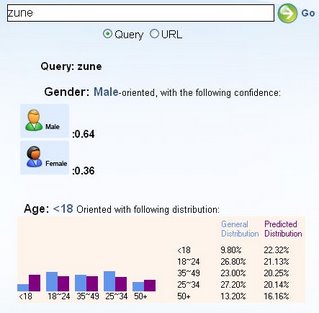There was a famous cartoon in the New Yorker Magazine with a caption, "On the Internet nobody knows that you are a dog." These days anyone with a bit of talent can get free or $1.99 hosting and put up an impressive web site. If the site causes someone to think that it is a substantial company, whose fault is it if something goes wrong?
Similarly, in the click fraud detection service area, companies need to check who is behind the companies that see your click data. Where does the data sit, who has access to it and is it secure? I don't mean to suggest that the proverbial entrepreneur-in-a-garage is evil. Far from it, given that companies such as Google and HP started in garages. You cannot really find out if organised crime is behind such a company - organised crime is already alleged to be behind some click fraud. Would your click data be valuable to a competitor? Think about it.
14 November 2006
13 November 2006
06 November 2006
CDD and PIRG (who?) complain about adCenter

I hadn't heard of the Center for Digital Democracy or the U.S. Public Interest Research Group, which isn't surprising since I am in Australia, but perhaps they need the publicity. They have complained about Microsoft adCenter and other online services that collect information. The PC World article says:
CDD Executive Director Jeff Chester called on the FTC to shut down new forms of online data collection until consumer safeguards are in place. "Consumers have the right to have the option to opt in [to data collection]," he said. "What is wrong with letting the consumers make decision about how their data is used?"Privacy fanatics want to be totally anonymous unless they deem otherwise. It's a nice thought but most of them don't run businesses, so they ignore the notion that business owners just might be able to deliver better service if they can collect some information about their customers. Similarly, there is a whole personalisation and CRM industry out there telling business owners to serve different customers differently (look up Peppers & Rogers).
Given my background in marketing and being a user of PPC advertising, I am on the side of CRM but this isn't about me. When Microsoft launched adCenter, I applauded the ability to refine the demographic target audience for my ads. I don't want to waste my money on an anonymous audience but I don't want to know their names and personal details.
I wonder if these complainants are aware that Google also allows demographic targeting. Why didn't they pick on the larger player? Here is the quote:
Chester called online data collection "pervasive and ubiquitous" and said the two groups focused first on Microsoft because it has told potential advertisers its data collection techniques are better than those used by rivals such as Google and Yahoo.How is this relevant to click fraud? It is, in the sense that to protect these privacy fanatics against phishing and other nasties (and advertisers from click fraud), someone needs to collect information, in this case, about the bad guys. I don't know if there is any way to identify the bad guys without collecting behavioural information!
I am active in running volunteer user groups and recently set up the Zune User Group. I used adCenter Labs to see what information was available about my target audience. Not surprisingly, I found that the target age group is <18,>
Subscribe to:
Posts (Atom)

